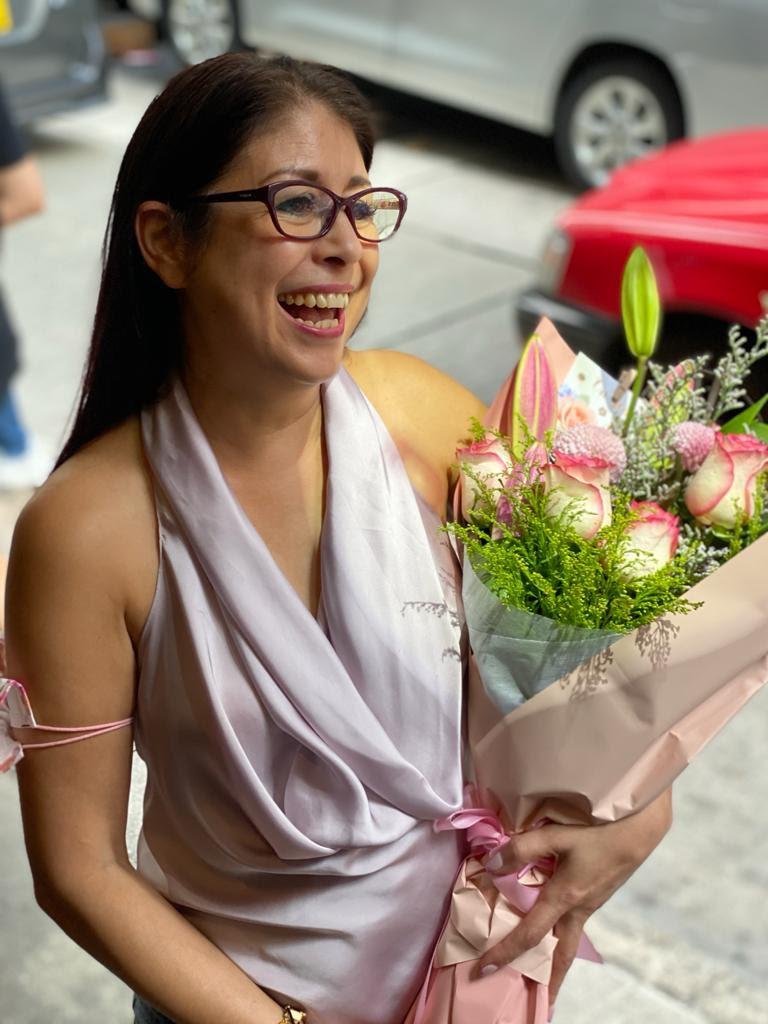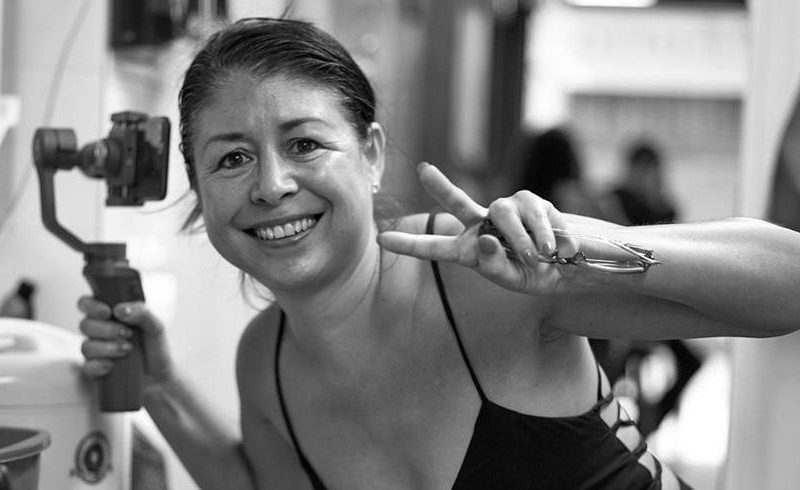The restaurateur has worked in hospitality for most of her life. She tells us about her F&B background, branching out and looking for a ray of light to guide business forward.

Having the time to sit down and chat uninterrupted for more than 10 minutes is a rarity for TM Chan. She would often like to do nothing more, but there is always something demanding her immediate attention – customers, never-ending phone messages, catering orders, suppliers, media interviews. Such is the life of a busy restaurateur.
TM opened her first restaurant, The Den, in Sai Ying Pun in 2013. When she found the space on Oaklands Path it had been sitting empty for two years. “When I rented it, I didn’t know what I was going to do with it,” she tells me. She eventually settled on a Wagyu steakhouse.
It would be the first restaurant of its kind in the area and perhaps a risk. “So many people told me it was the worst idea I’d ever had,” she reflects. Undeterred, she opened in partnership with her father, with him cooking and her front of house.
A few months after opening her father had to leave Hong Kong. TM hired a new chef but when he left and before finding a replacement, she was both cook and server. “I just rolled my sleeves up and got on with it,” she says.

This ‘get on with it’ attitude is a something she learned at a young age. TM grew up in Christchurch, New Zealand, where her parents ran two takeaway fish and chip shops and a 250-seat Chinese restaurant. As a nine-year-old she was already adept at prepping potatoes and battering fish. By the time she was 15, she had four part-time jobs.
As a child, TM and her family would come to Hong Kong to stay with her father’s family for three weeks over Christmas. In 1992, she decided to return alone and stay for work.
Her first job was in the first-class passenger lounge at Cathay Pacific. “I took that with the intention of getting cheap air tickets so I could travel, which I did for six months. When I came back, I worked in a couple of hotels but you had to dress and behave in a certain way that was too restrictive for me.”
The F&B scene was thriving and there were plenty of other opportunities for people looking to roll their sleeves up and get on with it.
Glitzy themed restaurant Planet Hollywood, which opened on Canton Road in 1994, proved to be one. TM joined soon after it opened and stayed for six years. “I started as a waitress but with the mentorship and encouragement of general manager Ron Moss, I worked my way up.
“When it closed I was assistant GM, so I had to lay off 250 staff, which was really hard because most of them had been there since it opened,” she says.
A four-year stint as general manager for Chris Lenz’s Igor’s Group followed. “I opened Wildfire in Stanley and then transferred over to Stormy Weather in Lan Kwai Fong. For a few years I worked at both, over in Stanley at the weekends and in Central during the week.”
When SARS hit Hong Kong in 2003, TM sent her young children to stay with her parents in New Zealand. After a while, they opted to stay where the grass was greener. TM handed in her notice at Igor’s and left to be with her kids.
What was it like to be back on home turf? “It was a really challenging time for me,” she says. “I was on a very good salary, but this is New Zealand, where tax is 33 percent.
“I was working nights so I had to have childcare and that was expensive. I was driving to work because taxis cost an arm and a leg, so there was petrol and parking costs. And rent to pay. After adding up all the expenses I was literally earning nothing!”
So what did you do? “I just thought sod it and I went to Australia. I took on several part-time jobs and was making a lot of money. Then I got a regular position as a manager with TGI Fridays.” But Hong Kong was calling.
After two years in Australia, she returned to Hong Kong to help a friend manage their bar. “I’d been single for a while,” she shares. “You work long hours in hospitality and I was working seven days a week. And I was over it. I wanted to date. I wanted to be able to go to the movies on a Friday night, go for cocktails and happy hours.”
TM was looking for a change. She turned her eye to renovating one of the properties she owned in Hong Kong. “It was a tiny, rinky-dink, two-bedroom place in Central and I transformed it into a tasteful bachelor pad.”
She invited some of the wealthier customers she’d met over the years to see the apartment before and after the renovation to demonstrate what she could do with their properties. They liked what they saw.
Now she had a small but growing construction company. She also took on work for the Pressman Group, running Pressroom and Classified on Hollywood Road. Doing both proved a challenge. “It all got too much and I had to stop.” TM’s sleeves had been rolled up to the limit.

In 2016 TM’s father spotted an empty shop for rent on High Street. Like many on the street it had once been a car repair garage.
Were you and your dad going to do something together again, like you had with The Den? “Yes. But instead of a Wagyu steakhouse it was going to be a bar serving pub grub. We created the menu and then advertised for chefs.”
She found chefs Ronnie and Rodel. “They were very talented but wanted a job where they could be taken as a team and have their own menu.”
Did that appeal to you? “I liked the fact that they wanted to take ownership of the kitchen and that I could give them a chance to grow because at every other company I’d worked for the menus and recipes came down from head office and the chefs had no opportunity to use their own ideas.”
Ronnie and Rodel presented their selection of Latin American and Peruvian-inspired fare. “Ronnie had lived and worked in Peru and South America so he had a lot of the recipes and knowledge,” TM explains. “Their food was outstanding. So I said: ‘OK, let’s try it for three to six months and if it works, we’ll keep it.’”
Pete’s Place was born. Six months later, TM rented the empty space next door as a dining room called TM’s by the Den, in which her chefs could expand their repertoire.

In 2019, The Den and TM’s by the Den/Pete’s Place won their first Best of the Best MasterChef Recommended Restaurant award (won again in 2020 and 2021), and TM and her son Anthony launched Bingaz Street Food on nearby Third Street.
The small restaurant quickly made a name for tasty noodles, skewers, wings and set lunches. Catering orders for summer junk trips were starting roll in. Bingaz was buzzing and TM’s family-run empire was steadily growing.
Protests in Hong Kong put a dent in that. But the new “C-word” hammered it. When Covid arrived in January, a series of confusing, accordion-like restrictions followed. We all remember it. Suffice to say 2020 was a horrid year for the F&B industry.
I ask TM what she did to adapt. “We focused on catering. We created menus for Halloween, family gatherings for Thanksgiving and Christmas parties of however many were legally allowed, and pushed them on Facebook. We also got orders through word of mouth.”

The low number of Covid cases and easing of dine-in restrictions have alleviated some of the pressures on the trade this year – although TM and Anthony decided to close Bingaz Street Food and merge its menu with TM’s by the Den.
Unfortunately, there are new pressures, such as rising food costs. “Suppliers don’t really have a choice but to increase their prices cause their first source is already up,” TM points out.
Indeed, producers globally have struggled with labour shortages, as well as peaks and troughs in buying. Supply chains have been disrupted, and airfreight and container shipping prices have shot up – all landing on the restaurant industry’s plate.
“The cost of my French fries has gone up by about 45 percent,” says TM. “That’s a huge jump! The cream and milk we buy is up 30 percent and the US ribs are up 40 percent.”
How do you absorb these costs without upping your menu prices? “I might have to. But if I do, I won’t have any customers. I basically have to suck it up! Right now I’m waiting and hoping that things will start settling down.”
Restaurants across Hong Kong are in the same boat. But it’s not only food prices; finding and retaining staff has become problematic. One reason, TM says, is because “they’re demanding more money”.
Why is that? “When the pandemic hit a lot of F&B people got no pay or were laid off. They couldn’t afford four, five, six months without pay. So a lot of them changed careers; many went to work for food delivery companies.”
A high percentage of workers from the Philippines, Nepal and Indonesia left to return to their home countries where the cost of living is much lower.
“At that stage there weren’t any vaccines,” TM points out. “And now Hong Kong is not allowing anybody in unless they’re vaccinated and they have to do quarantine. These workers can’t afford do that, so they can’t get back here.”
So a shortage of workers prompted a push for higher wages? “Yes. But even after getting this, a lot of them are still going for interviews. Places are desperate so they offer more money, but after a week or so the staff move on.
“I’ve even had bosses come into my restaurants to try and poach my staff. My staff say ‘oh my boss pays us well’, but the poachers just offer to pay more.” Have any of your staff gone? “No!”
It all sounds very stressful, I say. “It is. It affected my sleep. It’s been really challenging and hard to see the light at the end of the tunnel. But you just have to try to make the best of a bad situation.”
Any glimmer of light on the horizon? “Possibly a little glimpse, but things are still so foggy. What has been positive and what I’m just extremely grateful for is having such loyal staff and customers.”
Dropping by Pete’s Place some days after this interview, I was pleased to see TM in good spirits. A mountain of turkey baskets had just been delivered for orders that are already coming in for takeaway Thanksgiving and Christmas dinners.
Let’s hope that the light at the end of the tunnel grows brighter for all in Hong Kong’s F&B community – especially those who roll up their sleeves and keep on getting on with it.

